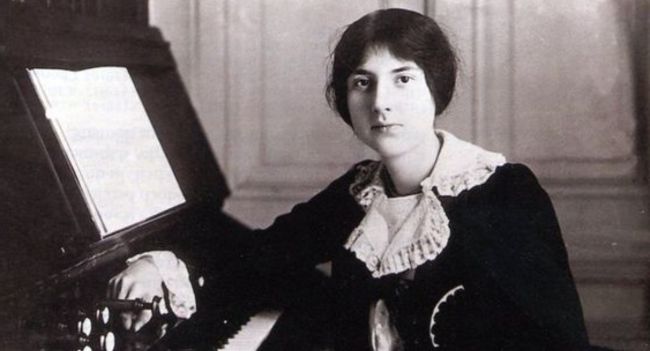By Heidi Staub
You may know of Nadia Boulanger, the French composer and conductor best known for her role of teaching many of the leading composers of the 20th century, including Aaron Copland, Quincy Jones, Philip Glass and Astor Piazzolla. But you could be forgiven for being less familiar with her younger sister, Lili, who died far too young at age 24 after a promising start of a career as a composer.

At 19, Lili Boulanger was the first woman to receive the prestigious Grand Prix de Rome for musical composition. It was a massive achievement for any young composer and an important turning point for women in the field.
Musical Prodigies
Nadia and Lili were born into a musical family. Their father, Ernest, was a composer who taught voice at the Paris Conservatoire, and their mother, Raïssa, was a singer. Both Nadia and Lili showed signs of incredible musical aptitude from an early age, leading them to study composition with Gabriel Fauré when they were very young. Nadia entered the Paris Conservatoire at age 9, and for the next several years Lili would accompany her sister to these classes when her health permitted. (Lili suffered a severe case of bronchial pneumonia when she was 2 and in general had poor health throughout her life, likely due to what we now call Crohn’s disease.)

Nadia began teaching immediately upon leaving the Conservatoire, all the while with her sights set on winning the Grand Prix de Rome, hoping to join the ranks of former winners such as Hector Berlioz, Georges Bizet, Claude Debussy and her father, Ernest Boulanger. She first submitted her work in 1906, and continued to diligently pursue this goal over the next few years. In 1908 she was awarded the Second Prize, although it has been said that her work was in fact the best and that it was her gender that prevented her from winning. She tried one more time, then abandoned the pursuit and poured her energy into teaching and performing.
It is safe to say that Nadia felt a great deal of pressure to provide financial support for her family as her father passed away in 1900 and her younger sister’s health was very unstable. When Lili was a baby, Ernest asked 6-year-old Nadia to promise to take care of her younger sister and be responsible for her welfare, a promise that Nadia took very seriously for the rest of her sister’s life. That promise likely contributed to her decision to focus on teaching as a way to provide for their family, feeling certain that she had no future as a composer after her numerous failures to secure the Grand Prix de Rome. She later told Fauré, “if there is one thing of which I am certain, it is that I wrote useless music.” He disagreed.
Lili’s Coming of Age
It was around the time that Nadia stopped chasing the Prix de Rome that the girls’ mother, Raïssa, encouraged 16-year-old Lili to consider pursuing an occupation. Ernest had passed away, so now the family consisted of three women. Raïssa felt that, due to Lili’s poor health, her daughter’s future was uncertain and marriage impossible. Therefore Lili must be prepared to support herself if necessary. What if something happened to her sister or mother? What would become of her then?

Up until that point, Lili’s studies had been sporadic, but when posed with the question of what she would do to support herself if necessary, she announced that she wanted to win the Prix de Rome. After making the decision to seriously pursue composing as a career, Lili poured herself into studying harmony, counterpoint, fugue and composition.
In The Life and Works of Lili Boulanger, Léonie Rosenstiel writes this decision “provided Lili with the means to decide her own future as much as possible, and to show her family, her friends, and, above all, herself, that she was capable of being considered a contributing member of the artistic and intellectual community in which she lived. In other words, it gave Lili the chance to develop a positive self-image … Lili’s physical dependence on others, especially her immediate family and their servants, was often total, but she enjoyed complete intellectual and artistic autonomy.”
Becoming a Composer
Lili first went for the Prix de Rome in 1912, but withdrew due to illness. She returned the next year with a renewed vigor and this time went all the way, winning the Grand Prix de Rome in 1913 for her cantata, Faust et Hélène. Her success led to a contract with one of the most important music publishers at the time, Ricordi, providing a regular income, a place to publish her works and a platform for publicity.
The next five years were spent with bouts of poor health, fervent composing and organized efforts along with her sister, Nadia, to support the French soldiers during World War I. Lili wrote in a letter to her friend Miki Piré while she was bedridden with bronchitis, “I feel discouraged … not because of the suffering, not because of boredom, but because I understand that I would never be able to have in me the feeling that I have done what I would like to do, but what I have to do, since I cannot follow whatever it is with being interrupted for a long time so that my efforts cannot be sustained!”
Despite her discouragement, Lili remarkably produced over 50 works in her ten years composing. D’un matin de printemps (“Of a Spring Morning”) was one of the last pieces that she was healthy enough to copy out herself before she passed away at age 24 in 1918. As Seattle Symphony annotator Paul Schiavo writes in his notes for the program, in it we see “how much Lili Boulanger’s early demise cost French music.”
